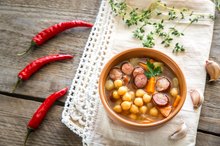What does fact checked mean?
At Healthfully, we strive to deliver objective content that is accurate and up-to-date. Our team periodically reviews articles in order to ensure content quality. The sources cited below consist of evidence from peer-reviewed journals, prominent medical organizations, academic associations, and government data.
- Linus Pauling Institute; Micronutrient Information Center Vitamin K; Jane Higdon, Ph.D.; May 2008
- Cleveland Clinic; Drugs & Supplements Coumadin; February 2006
The information contained on this site is for informational purposes only, and should not be used as a substitute for the advice of a professional health care provider. Please check with the appropriate physician regarding health questions and concerns. Although we strive to deliver accurate and up-to-date information, no guarantee to that effect is made.
Warfarin & Oranges
Warfarin is a very important and effective drug used to decrease the blood’s tendency to form clots. Warfarin functions by interacting with vitamin K in the body, and vitamin K intake should therefore be consistent in order for the drug to work optimally. It is important to be aware of foods that are very high in vitamin K; however, oranges are low in vitamin K and need not be considered when using warfarin.
Warfarin
Warfarin is an anticoagulant, a drug also known as a “blood thinner” that is prescribed to people who are at a higher risk of forming blood clots. Warfarin can prevent a potentially harmful clot from forming and blocking blood flow in the body. The drug is an antagonist of vitamin K and it prevents it from synthesizing clotting factors, thereby creating an anticoagulation effect. Regular blood tests will be ordered by the prescribing physician to make sure the drug is working properly. Finding the lowest therapeutic dose will help prevent bleeding, which is a side effect of warfarin.
- Warfarin is an anticoagulant, a drug also known as a “blood thinner” that is prescribed to people who are at a higher risk of forming blood clots.
Vitamin K
Does Green Tea Affect Coumadin?
Learn More
Vitamin K is a fat-soluble vitamin of which, according to the Linus Pauling Institute’s Micronutrient Research Center for Optimal Health, the only known biological function is as a cofactor for an enzyme that initiates a cascade of reactions that activate clotting factors 2. Bleeding is stopped by forming clots, so vitamin K is essential in this normal body function. However, when warfarin is prescribed, a functional vitamin K deficiency is created and the body’s use of the vitamin is blocked.
Diet and Warfarin
Phylloquinone, or vitamin K1, is the major form of vitamin K in the diet. According to the Cleveland Clinic, foods very high in vitamin K include:
- broccoli
- cauliflower
- cabbage
- soy oil
- green tea
- tofu
- spinach
- other dark leafy greens
For those who take warfarin, it is recommended to avoid large fluctuations in vitamin K intake. Large amounts of vitamin K can cause the drug to become less effective, and consuming vitamin K in smaller amounts than is customary for a particular person may increase the effectiveness of the drug and result in bleeding. Maintaining a consistent intake of vitamin K in the diet will allow the physician to make the most therapeutic changes to the warfarin dose.
- Phylloquinone, or vitamin K1, is the major form of vitamin K in the diet.
- Large amounts of vitamin K can cause the drug to become less effective, and consuming vitamin K in smaller amounts than is customary for a particular person may increase the effectiveness of the drug and result in bleeding.
Oranges
Does Vitamin C Affect Coumadin?
Learn More
According to the Food and Nutrition Board of the Institute of Medicine, adult males require 120 mcg per day of vitamin K and adult females require 90 mcg per day. For a person using warfarin, it is generally recommended to consume these established amounts. The nutrient data base of the US Department of Agriculture denotes that a fresh, raw orange contains nearly no vitamin K and most varieties of orange juice contain about 0.2 mcg of vitamin K. The amount of vitamin K in oranges and orange products is negligible and should not be considered when taking warfarin.
- According to the Food and Nutrition Board of the Institute of Medicine, adult males require 120 mcg per day of vitamin K and adult females require 90 mcg per day.
- The nutrient data base of the US Department of Agriculture denotes that a fresh, raw orange contains nearly no vitamin K and most varieties of orange juice contain about 0.2 mcg of vitamin K. The amount of vitamin K in oranges and orange products is negligible and should not be considered when taking warfarin.
Related Articles
References
- American Academy of Family Physicians; Warfarin Therapy: Evolving Strategies in Anticoagulation; Jon Horton, PharmD and Brue Bushwick, MD; February 1999
- Linus Pauling Institute; Micronutrient Information Center Vitamin K; Jane Higdon, Ph.D.; May 2008
- Cleveland Clinic; Drugs & Supplements Coumadin; February 2006
- Coumadin (warfarin sodium) [package insert]. Princeton, New Jersey: Bristol-Myers Squibb, 20XX.
- Harter K, Levine M, Henderson SO. Anticoagulation drug therapy: a review. West J Emerg Med. 2015;16(1):11-7. DOI: 10.5811/westjem.2014.12.22933
- Patel S, Patel N. Warfarin. In: StatPearls [Internet]. Treasure Island (FL): StatPearls Publishing.
- Tideman PA, Tirimacco R, St John A, Roberts GW. How to manage warfarin therapy. Aust Prescr. 2015;38(2):44-8. DOI: 10.18773/austprescr.2015.016
Writer Bio
Melanie Di Stante is a registered dietitian and a NCBDE-certified diabetes educator with more than 10 years of experience. She received a bachelor's degree in dietetics from the University of Connecticut and a master's degree in human nutrition from the City University of New York. Di Stante has been writing professionally for more than 10 years, contributing to local newspapers and "Today's Dietitian."









